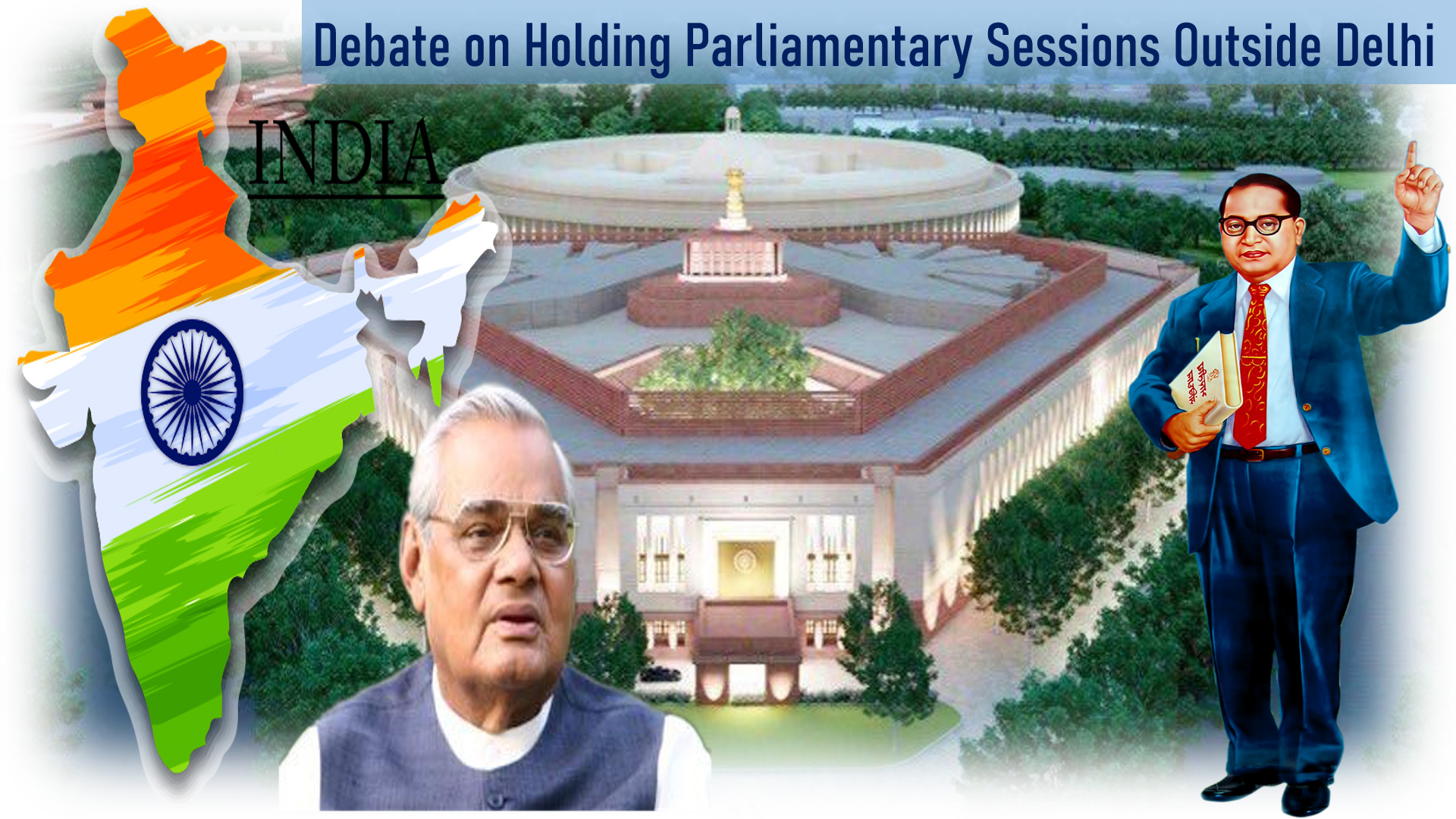Decentralization and Climate - From Ambedkar to Today, The Push for Parliamentary Sessions in Southern India | (Thu 05 Dec 2024 09:40)

In recent months, the idea of conducting parliamentary sessions in South India has gained attention, sparked by a proposal from a YSR Congress Member of Parliament (MP). The MP's argument revolves around the logistical and climatic challenges faced by Members of Parliament (MPs) during Delhi’s harsh winters and scorching summers. The proposal has reignited a long-standing debate, one that has historical backing from figures like Dr. B.R. Ambedkar and Atal Bihari Vajpayee. While some see it as a step toward greater inclusivity and decentralization, others question its feasibility, citing potential logistical hurdles and risks of deepening regional divides.
A Historical Proposition: Ambedkar’s Vision for Two Capitals
The idea of decentralizing India’s parliamentary operations has deep historical roots. In his book “Thoughts on Linguistic States”, Dr. B.R. Ambedkar suggested that India should not have just one capital in Delhi. His reasoning was based on both practical and political considerations. Ambedkar argued that Delhi’s extreme weather conditions, coupled with its distance from southern states, made it inconvenient for MPs from the south. This made them feel somewhat alienated from the decision-making process, and in his view, it was not conducive to national integration.
Ambedkar also raised concerns about Delhi’s vulnerability to attacks due to its proximity to neighboring countries. He proposed Hyderabad as a second capital, citing its central location, moderate climate, and strategic position as a potential hub for parliamentary sessions, especially during the summer months.
A Private Member’s Resolution: Atal Bihari Vajpayee’s Support
The idea of holding parliamentary sessions outside Delhi didn’t remain confined to Ambedkar’s proposals. In November 1959, Prakash Vir Shastri, an independent Member of Parliament from Gurgaon, introduced a Private Member’s Resolution to hold sessions of the Lok Sabha in South India. He suggested Hyderabad or Bangalore as potential locations.
This resolution gained significant backing, notably from a young Atal Bihari Vajpayee, who was then serving as a first-time MP. Vajpayee, known for his nationalist outlook, supported the proposal, emphasizing that the move was not just political but aimed at strengthening national unity. He argued that holding sessions in the South would increase inclusivity and should not be viewed through a narrow regional lens.
The Constitutional Framework: Flexibility in Location
Interestingly, India’s Constitution does not mandate a specific location for parliamentary sessions. Article 85 gives the President of India the authority to summon Parliament at any time and place deemed appropriate, as long as no more than six months elapse between sessions. This provision has traditionally been interpreted as allowing flexibility in the location of parliamentary meetings.
However, despite this constitutional flexibility, Delhi has remained the central hub for parliamentary proceedings. Over the years, the idea of shifting sessions to another city has been largely debated but never fully realized.
Arguments for Holding Sessions Outside Delhi
Supporters of the proposal argue that moving parliamentary sessions to South India could bring several benefits. One of the strongest arguments is the enhanced regional representation it would offer to southern states. As MPs from the South would find it easier to participate in sessions closer to home, the move could symbolize a commitment to inclusive governance where every region feels heard and represented.
The climatic conditions in Delhi also present a significant challenge. The extreme heat in summer and harsh winters can make working conditions difficult, potentially affecting MPs’ health and productivity. A more temperate climate in cities like Hyderabad or Bangalore could lead to improved health and efficiency, allowing MPs to work in more conducive environments, and thus, ensuring more effective governance.
Another key argument is that such a move could be a part of a broader decentralization of power, aligning with democratic ideals where governance is not confined to one region. This could help in shifting the perception that Delhi’s political elite dominates the governance process, giving people from all regions a stronger stake in the decision-making process.
The Logistical and Political Challenges
Despite these potential benefits, critics of the proposal point to a series of practical and political challenges. First, the logistical hurdles involved in relocating parliamentary machinery, infrastructure, and personnel to another city would be complex and costly. Managing such a shift, even for a few sessions, could result in tedious preparations and resource wastage, detracting from the time and energy spent on actual legislative work.
Political critics also argue that holding sessions outside Delhi could exacerbate the North-South divide in India, fueling regional identities and political tensions. For decades, Parliament has functioned from Delhi without diminishing the integration of southern states into the Indian Union. The existing parliamentary mechanisms, critics argue, are already sufficient for ensuring regional representation, and a shift in location might politicize the issue rather than solve any existing problems.
Examples from Other Countries
The concept of multiple capitals is not entirely unique to India. Countries like South Africa, Malaysia, and Switzerland have adopted decentralized models of governance. South Africa, for instance, operates with three capitals: Pretoria (administrative), Cape Town (legislative), and Bloemfontein (judicial). This division allows for a more inclusive representation of the country’s diverse regions. Similarly, Malaysia has two capitals—Kuala Lumpur as the administrative capital and Putrajaya for governance-related functions. These examples demonstrate that decentralized governance can work, but they also underscore the complexity of such a system.
The Way Forward
Instead of immediately relocating parliamentary sessions to the South, a pilot approach could be explored. For instance, conducting occasional parliamentary sessions or committee meetings in cities like Bangalore or Hyderabad could allow for a better understanding of the logistical challenges and the public response to such a move. Moreover, strengthening regional representation through reforms like increasing parliamentary seats for southern states could address the issue of underrepresentation without the need for such a dramatic shift.
Additionally, investment in technology and logistics could allow MPs from all regions to participate more easily in sessions, reducing the need for physical relocation.
Conclusion
The proposal to hold parliamentary sessions in South India reflects the ongoing debate about regional representation, climatic challenges, and decentralization. While it offers a promising vision of a more inclusive and efficient governance model, its practical challenges and political implications require careful consideration. A gradual approach, integrating technology and strengthening existing systems, could offer a balanced solution, ensuring that the voices of all regions are heard without disrupting the functioning of India’s Parliament.

Physics, Chemistry, Biology and Geography.

Computer Programming, languages & their frameworks.

Economics, Accounts and Management.

Reviewing old and new books.

Ancient, Medieval, Modern, World History.

Indian Constitution, Politics, Policies, etc.

Everything related to International Affairs.

For all humanities topics, except History & Polity.

Anything related to entertainment industry.

Mainly Cricket but other sports too.

CS, IT, Services & Corporate Sector.
Comments
No comments yet. Be the first to comment!
Leave a Comment